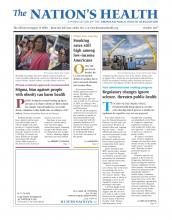Feeling overwhelmed? You’re not alone. Life can be hectic, and we could all use a moment to breathe and clear our heads from time to time. Juggling responsibilities at work and home can make it difficult to focus on the present instead of worrying about what comes next.
If you find yourself struggling to let yourself relax in the moment, it might be worth giving mindfulness meditation a try.
Mindfulness meditation is a practice that uses both the mind and body to achieve calmness, focus and relaxation. People use mindfulness meditation to help them cope with the challenges that life throws at us every day.
The practice may also help people manage some mental and physical health problems. Just thinking more deeply about where you stand in the present can be helpful for dealing with everyday problems.

Photo by Peopleimages, courtesy iStockphoto: Two women in class
“We multitask, we’re involved in many, many activities, and mindfulness meditation (is) a wonderful way to focus our attention on how we’re actually experiencing the world and...taking stock of what’s important in our lives,” says Emmeline Edwards, PhD, director of the Division of Extramural Research at the National Center for Complementary and Integrative Health.
The beauty of mindfulness meditation is that there’s no wrong way to do it. But there are certain elements to the practice that make for the best possible experience.
According to the NCCIH, practicing in a quiet space, getting into a comfortable posture, staying focused and not worrying about distractions are all important steps for getting the most out of mindfulness meditation.
But there’s plenty of room to experiment. Mindfulness meditation isn’t a one-size-fits-all practice, and you can adapt your practice so that it fits your needs. You may prefer to stand up, sit down, lie down or even take a walk.
Mindfulness meditation is something that you can do almost any time as long as you are in a space that allows you to focus on your breathing and your body.
“It’s very helpful to find a quiet location with as few distractions as possible so you can help yourself disconnect,” Edwards says.
Mindfulness meditation gives you the opportunity not to dwell on the laundry, mortgage, presentation at work or whatever else may be weighing heavily on your mind, so allow yourself to fully take in the experience. You may even want to find a space in your home that you can use for mindfulness meditation on a regular basis.
Consistency is important for practicing mindfulness meditation, Edwards says. Find ways to include a little mindfulness meditation into your routine as often as you can. The more time you can dedicate to it the better, but even taking a few minutes each day to get into a habit will make you more likely to keep it up — and feel better in the long-run.
There are many different ways to approach mindfulness meditation, Edwards says. She notes that some practices focus on values such as kindness, while others are specific to health concerns, such as stress reduction or dealing with insomnia. People may also opt to practice guided meditation with the help of an app, although it is not necessary to use one, she says.
“It’s a wonderful tool, it does not require any special equipment and it can definitely improve one’s quality of life,” Edwards says.
Some studies have suggested that mindfulness meditation may help with chronic health issues. But Edwards stresses that the practice shouldn’t be thought of as a cure-all for illness.
Instead, she says you should think of mindfulness meditation as a way to help you cope with daily stressors. It can give you the strength to overcome challenges with grace and the determination to keep going.
Meditation for the whole family
Mindfulness meditation isn’t just for grown-ups. Even children can benefit from the practice, learning how to get in touch with their emotions and stay focused. The teachings of meditation are great foundations for young children.
Children get overwhelmed too. Why not give your kids a simple way to slow down and breathe when they need to calm down?
You can teach your kids how to pay attention to their breathing and let them take part in mindfulness meditation for a few minutes each day, whether unwinding after school or getting into a routine before bedtime.
- Copyright The Nation’s Health, American Public Health Association









